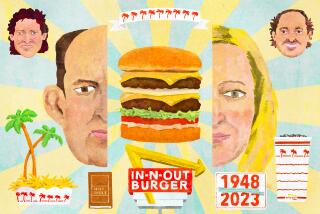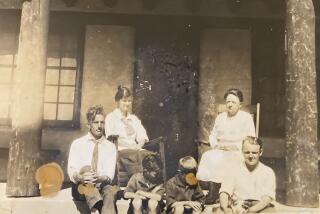Laura Scudder Was More Than a Name : Monterey Park Will Honor ‘Pioneer, Instigator, Doer’ Who Helped Create Snack-Food Industry
- Share via
When she died 30 years ago, the newspapers called her the Potato Chip Queen of the West.
But, as the decades have passed, Laura Scudder has faded from public memory, to the point where there is little to suggest that she existed, beyond being a name on a potato chip bag or a peanut butter jar.
So now, in a suburban city whose historical roots don’t go much deeper than the trees planted in the first housing tracts developed there after World War I, Monterey Park is laying claim to its local hero.
The life and times of Laura C. Scudder will be the focus of an afternoon celebration at the city’s Garvey Ranch Park historical museum on April 23.
“She was a woman in business, ahead of her time,” said Louis Davis, Monterey Park’s city treasurer and president of its historical society. “I can just imagine what she had to go through.”
Working from a dusty two-acre parcel that she and her husband bought in 1920, Scudder parlayed a home-grown potato chip business into a multimillion-dollar food empire that spanned California, Nevada, Arizona and Oregon.
She started the business in 1926, at the suggestion of a friend, in a brick building she and her husband had built next to their home and a gas station they ran. They had previously rented the building to a barber who, in those Prohibition days, turned out to be a bootlegger.
Scudder, a Republican and an Episcopalian, kicked out the bootlegger. Without the rent income, she had another motivation to make and sell potato chips: to support her family. She had four children, and her husband’s health had failed since a car fell on him at the station.
“She was a pioneer, an instigator, a doer. . . .” says a pamphlet written by Joseph R. Blackstock, a former president of the Monterey Park Historical Society. “She also helped create the potato chip-snack food industry.”
Besides being strong-willed, Scudder was a big, good-looking woman whose trademark was wearing wide, flat-brimmed hats. Advertisements showed photographs of her in hat and gloves, a purse under her arm. Her signature followed ad copy that often included recipes.
Blackstock, who is director of market research for Patrick Media in Los Angeles, once helped Scudder with billboard advertising. He says: “In 1926 there were almost no women in America starting food businesses, although food is considered women’s business.
“Even today, if we went out to find a woman running her own food business--I mean a big one, and as the chief executive officer--where would (she) be?”
Beyond that, several factors have prompted the Monterey Park Historical Society to honor Scudder. Eighteen months ago, John Scudder of Hermosa Beach decided to make a film about his grandmother. After extensive research funded by money he inherited from her, Scudder completed a 53-minute color video entitled “Laura.” It will be featured in the April 23 celebration of Laura Scudder Day.
Also, the Scudder family last year gave $15,000 to the historical society to fund scholarships for graduates of Alhambra High School, which Laura Scudder’s children attended.
To Preserve Story
John Scudder, a studio photographer by trade, previously made a video about humanitarian Albert Schweitzer. He said he began the “Laura” project “to preserve the story before it blew away.” Mostly, he wanted to make a film for his family.
Scudder, who was 12 when his grandmother died, said: “I thought I knew her story pretty well. But I really didn’t.”
The more he researched, the more Scudder realized that it was a story with much wider appeal. “It’s a motivational story,” he said, “about hard times, and inspiring to both men and women.”
He contacted Blackstock, who more than a decade earlier had conducted his own lengthy research.
Blackstock, who got the idea in 1971, said: “A 350-page book had just come out about Sirhan Sirhan, the murderer of Robert Kennedy. I thought, ‘Here you got a great big volume about a murderer and not a word about Mrs. Scudder.’ ”
Visited Plant
As a child growing up in the San Gabriel Valley, Blackstock went with school friends to visit the Scudder operation on the northeast corner of Garvey Avenue and Atlantic Boulevard. For decades, he said, it was the only large business in Monterey Park. The firm moved to Anaheim in 1960.
Laura Scudder and her family sold the business in 1957. Since then, it has changed hands three other times. The latest transaction occurred in 1987, when the business--which has expanded far beyond its original product line of potato chips, peanut butter, mayonnaise and toasted nuts--was sold for $100 million to Borden Inc.
Both Blackstock and John Scudder discovered that Laura was much more than the founder of a potato chip company. Although she closely guarded her privacy, her grandson said, “she had a lot of heart and a lot of love, and she was real tough businesswoman, too. It was a great combination.”
Born in Philadelphia in 1881, she was the only child of parents of modest means. Her mother died when Laura was 2. Relations were strained between Laura and her father, a baker and butcher.
Married Patient
She went to nursing school because she couldn’t afford to go to medical school. Eventually she married one of her patients, Charles Scudder, a farmer and inventor.
For a while, Blackstock said, they lived with Charles’ relatives on the Scudder family farm, where earlier Scudders had welcomed George Washington and his troops the night they made their famous crossing of the Delaware.
But Laura apparently grew tired of this setting. With her trunk packed, she told her husband one day in 1910: “I’m going West.” He decided to go with her.
First in Seattle and later in the Northern California community of Ukiah, they struggled to create a life that would take them beyond the days when they ate mush meal for Christmas and when, Laura once wrote, “We didn’t have a nickel even to buy a little doll” as a Christmas gift for their children.
In Ukiah, she and her husband ran the Little Davenport restaurant. Lawyers at the courthouse across the street hailed her as a great cook. She asked them how she could become a lawyer.
Reading from borrowed books, she learned enough to take the bar exam. She traveled by train to Sacramento while four months’ pregnant and easily passed, becoming the first woman lawyer in Ukiah’s history. Although she never practiced law, she used her legal skills in her business.
“Laura could do anything,” said Blackstock, who spent three years interviewing hundreds of people around the nation for his pamphlet. “She lacked what most humans have: those gremlins that say, ‘I can’t do it.’ I just regret there are no statues, no streets named, no schools in her honor in Monterey Park.”
Both Blackstock and John Scudder had difficulty doing their research. “She was a private person,” Blackstock said. “You could be working with her, but that doesn’t mean you’re going to know Laura Scudder.”
This privacy was not the result of anything mysterious, John Scudder said. “There wasn’t anything I found that was embarrassing or any dirty laundry.”
If anything, they found people ready to praise Scudder for running a hometown family business that employed many of the poorer women of Monterey Park and gave work during the Depression to those no one else would help--the housewives.
Some of these women spoke of being grateful to work, even in their homes. They fashioned waxed-paper bags for the potato chips, ironing three sides of the bags before they were taken back to the plant to be filled and sealed.
Laura Scudder was among the first potato chip companies to use waxed bags to ensure freshness, Blackstock said. When chips were sold in markets in the early 20th Century, they were dispensed from glass cases into paper bags.
As a nurse, Scudder often treated her employees for injuries. Once she heard that a worker was crying on the job because her daughter had run away. “Mrs. Scudder picked up the phone, hired a private detective and, in a day or two, had the kid back,” Blackstock said.
Tough on Debtors
Still, she was hard-nosed in business, known for paying her bills the day they arrived and being equally tough on those who owed her. In 1928, the year her husband, Charles, died, she went ahead with plans to build another plant in Oakland. By 1953, when she opened a plant in Fresno, the company had 1,000 employees and about 50% of the California potato chip market.
To ensure freshness for the dairy products in her mayonnaise, she bought a ranch on Workman Mill Road, near today’s intersection of the San Gabriel River and Pomona freeways, where she raised her own chickens and cows. “It was a little unfair to say she did it all,” Blackstock said, noting that her children and relatives also helped develop the company. “But it was her business, period.”
After her husband died, she was increasingly aided by his son from a previous marriage, also named Charles, who had come to live with the Scudders. After his father’s death, he and Laura Scudder married when they both were middle-aged. “Monterey Park could never get over that,” said Blackstock. “Yet they were in no way related, really, before they married.”
Scudder was strong enough to take any criticism. When she first went into business, Blackstock said, she couldn’t get any insurance for the firm’s one delivery truck. Insurance agents told her that she was a woman and couldn’t be relied upon to stay in business long enough to pay the premium.
So she found a woman insurance agent in Los Angeles who eventually got the business of insuring hundreds of Scudder delivery trucks.
And when the men of Monterey Park wouldn’t support a parks bond issue, she said at a public meeting that if the men had to stay home and take care of the children for a few days, they would see how important parks were.
In an interview with Eli Isenberg, publisher of the Monterey Park Progress, Scudder once said: “I’m a working girl. We’re planted on earth to work, and day by day I do the best I can.”
Isenberg noted: “The essence of this woman is not to be found in the money she made.”
More to Read
Sign up for Essential California
The most important California stories and recommendations in your inbox every morning.
You may occasionally receive promotional content from the Los Angeles Times.













